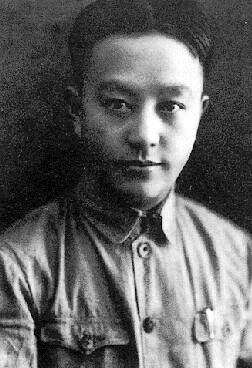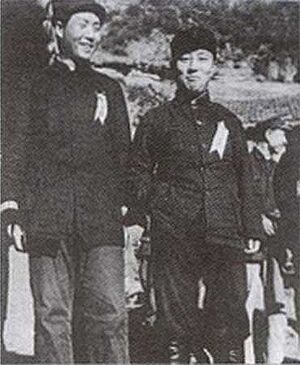Wang Ming facts for kids
Quick facts for kids
Wang Ming
|
|
|---|---|
|
王明
|
|
 |
|
| General Secretary of the Chinese Communist Party (acting) | |
| In office June 1931 – September 1931 |
|
| Preceded by | Xiang Zhongfa |
| Succeeded by | Bo Gu |
| 1st Head of CCP Central United Front Department | |
| In office 1942–1947 |
|
| Preceded by | Position established |
| Succeeded by | Zhou Enlai |
| Member of the 6th Politburo of the Chinese Communist Party | |
| In office 1928–1945 |
|
| Director of the Legal Committee of the Central People's Government Administration Council | |
| In office 21 October 1949 – 27 September 1954 |
|
| Premier | Zhou Enlai |
| Personal details | |
| Born |
Chen Shaoyu
23 May 1904 Jinzhai, Anhui, Qing dynasty |
| Died | 27 March 1974 (aged 69) Moscow, Soviet Union |
| Nationality | Chinese |
| Political party | Chinese Communist Party |
| Spouse | Meng Qingshu (Chinese: 孟庆树) |
| Relations | Huang Lianfang (stepmother; Chinese: 黄莲芳) |
| Children | Chen Fangni (Chinese: 陈芳妮) Chen Danzhi (Chinese: 陈丹芝) Chen Danding (Chinese: 陈丹丁) |
| Parents | Chen Pinzhi (Chinese: 陈聘之) Yu Youhua (Chinese: 喻幼华) |
| Alma mater | Wuhan University Moscow Sun Yat-sen University |
| Occupation | Politician |
Wang Ming (Chinese: 王明; pinyin: Wáng Míng; May 23, 1904 – March 27, 1974) was an important leader of the early Chinese Communist Party (CCP). He was a key figure in a group called the 28 Bolsheviks. Wang Ming was also a political rival of Mao Zedong in the 1930s. He disagreed with Mao's ideas about how the Chinese revolution should happen.
Contents
Early Life and Education
Wang Ming was born on May 23, 1904, in Jinzhai, Anhui. His birth name was Chen Shaoyu (Chinese: 陈绍禹). He came from a family who were farmers. In 1920, he started elementary school. Later, he attended an agricultural school founded by a revolutionary named Zhu Yunshan. Zhu introduced Wang to many new ideas and books about communism. Wang's teacher, A Ying, also taught him about important figures like Vladimir Lenin.
During his school years, Wang was involved in politics. He led protests against Japanese products and unfair elections. After graduating in 1924, he studied at Wuchang Business School. There, he wrote articles about revolution and communism. He also joined the May 30 Movement, which involved strikes against foreign influence in Wuchang. In the summer of 1924, Wang joined the CCP.
From Moscow to Shanghai
In November 1925, the CCP sent Wang to Moscow Sun Yat-sen University in Russia. He learned the Russian language and studied Marxist–Leninist theory. He became known by the Russian name Ivan Andreevich Golubev. While in Moscow, Wang became a favorite of Pavel Mif, the university's vice president. In January 1927, Wang worked as an interpreter for Mif when Mif visited China.
After the CCP and the Kuomintang (KMT) split in 1927, Wang returned to Moscow with Mif. Mif became president of Moscow Sun Yat-sen University. Wang became Mif's trusted helper. With other activists like Zhang Wentian and Bo Gu, Wang Ming formed the 28 Bolsheviks group. They believed they were following true communist ideas.
In 1929, Wang and the 28 Bolsheviks returned to China. They hoped to lead the CCP, but faced resistance from other members. Wang was given less important jobs. He also married Meng Qingshu, a member of the 28 Bolsheviks. Wang published many articles supporting the party's left-wing ideas. In 1930, he was arrested in Shanghai but was soon released.
Wang later disagreed with some party leaders. He was moved to the Jiangsu division of the CCP. In December 1930, Mif came to China again. With Mif's strong support, Wang and his group gained more power in the CCP. Wang became an important advisor to Mif. Even though Xiang Zhongfa was the official leader, Mif and Wang guided him.
From Moscow to Yan'an
From 1931 to 1937, Wang lived in Moscow. He was the director of the CCP's group there. He was also elected to important positions in the Comintern, an international communist organization. This showed how important he was in the communist world.
During this time, the CCP faced many challenges in China. This led to the Long March, a long retreat by the CCP army. At the Zunyi Conference, the 28 Bolsheviks group broke apart. Key members like Zhang Wentian and Wang Jiaxiang began to support Mao Zedong. Mao started to become the main leader of the CCP.
In 1931, Japan invaded parts of northeast China. Wang played a role in calling for a "united front" against Japan. This meant all Chinese groups should work together against the invaders. In 1935, the CCP group in Moscow issued a statement asking Chinese people to unite against Japan. Wang believed that Chiang Kai-shek, the KMT leader, could be an ally against Japan.
In 1936, the Xi'an Incident happened, where Chiang Kai-shek was briefly held. This helped push for a united front. By 1937, a full-scale war between China and Japan began. Wang's idea of a united front was put into action. The CCP's Red Army became part of the national army to fight Japan.
Wang returned to Yan'an in China after six years. Mao Zedong showed respect for Wang. Mao needed support from the Comintern and the Soviet Union, who were behind Wang. Wang tried to reorganize the CCP leadership. However, some of his potential supporters turned to Mao's side.
Wang was admired by many CCP members for his knowledge of Marxism. Some senior leaders, like Zhou Enlai and Peng Dehuai, respected him. Wang and Mao began to disagree on how the United Front should work. Wang thought all CCP work should be part of the United Front. Mao believed the CCP should stay independent. Wang left the main CCP headquarters to work on United Front issues in Wuhan. This allowed Mao to strengthen his power in Yan'an without Wang's interference.
Political Decline
The KMT suffered heavy losses fighting Japan. As a strong supporter of the United Front, Wang's influence also weakened. After major battles in 1938, Wang's division was closed, and he was sent back to Yan'an. This was part of Mao's plan to weaken Wang's allies and promote his own supporters. Wang was given less important jobs.
Mao also used propaganda to reduce Wang's authority. In 1943, the Comintern was dissolved, which further weakened Wang's position. In 1942, Mao started the Yan'an Rectification Movement. This movement targeted those who followed ideas too strictly without adapting them. Wang became a main target. He faced humiliation and stress, which affected his health.
Wang was forced to apologize publicly. Mao stopped persecuting him only after receiving a message from a Soviet leader, Georgi Dimitrov. As a sign of leniency, Mao kept Wang on the CCP's Central Committee. During the Chinese Civil War, Wang worked on policy research and legislative tasks, but had little real power.
Later Life in Moscow
After the People's Republic of China was founded in 1949, Wang reappeared in public life. He was elected director of the Central Legal Committee. In 1956, before a major party meeting, Wang went to Moscow for medical treatment. He never returned to China.
Wang wrote many articles criticizing the CCP during the disagreements between the CCP and the Soviet Communist Party in the 1960s and 1970s. His writings provided some information about CCP history. Wang was fortunate to avoid the Cultural Revolution in China. He lived peacefully in Moscow until his death in 1974.
Images for kids
See also
 In Spanish: Wang Ming para niños
In Spanish: Wang Ming para niños



